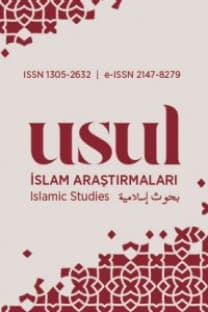Bir Bektâşî Dedebabası Bedri Noyan’a (1912-1997) Göre Zâhir Bâtın İlişkisi
Müslümanların bilme kavramına verdikleri önem, kavramın tanımı üzerine yoğunlaşmayı da beraberinde getirmiştir. Bektâşî Dedebabası Bedri Noyan, İslâm’ın anlaşılmasında İslâm tasavvufuna dikkat çekmekle birlikte Bektâşîliğe özel bir vurguda bulunmuştur. Bu olağan tavrı kavramları tanımlarken de kendini göstermektedir. Bâtın ilmi olarak gördüğü tasavvufî bilgiyi zâhir olarak ifade ettiği şeriat bilgisine üstün görmüştür. Noyan, bu özel bilginin tanımı, niteliği, değeri gibi konularda Bektâşîlik ve diğer tasavvuf erbabının müşterek savunmalarına yer vermiştir. Avâm ve havâssın belirlenmesinde de Bektâşîliğe ayrı bir önem atfetmiştir. Alevîler de dâhil olmak üzere, vahdet-i vücûd bilgisine erişemeyenleri, Bektâşî olmayanları, kimi zaman saraya mukabil halkı, kimi zaman da medresenin karşısında dergâhları avâm olarak görmüş buna dayalı değerlendirmelerde bulunmuştur. Zaman zaman tartışmalara neden olabilecek kavramlarla ilgili sübjektif açıklamalarda bulunmuştur.
Anahtar Kelimeler:
Bedri Noyan, Bektâşîlik, Zahîr-Bâtın, Tasavvuf
The Relation Between Literal and Esoteric Meaning According to Bektashi Master Father (Dedebaba) Bedri Noyan
The importance given by Muslims to the concept of knowledge requires concentration on the definition of the concept as well. Bektashi Master Father (Dedebaba) Bedri Noyan has made a special emphasis on Sûfîsm in his understanding of Islam, in particular to the Bektashi understanding. This attitude can be seen in his definition of concepts. He considers the knowledge of Sharia, literal meaning, inferior from the mystical - esoteric - knowledge. Noyan gives common understanding of Bektashi and other Sûfî orders in his definition of specific knowledge, its qualifications and its value. In his definition of ordinary people versus elected people, he also refers to the Bektashi understanding. He considers those who could not reach to the knowledge of the unity of being, the nonBektashis, sometimes seeing those who are against the palace, and other times the Sufi orders across the madrasas as the commons and evaluates them accordingly. He has given subjective explanations on concepts that can be considered controversial.
Keywords:
Bedri Noyan, Bektashism, Literal and Esoteric meaning, Sûfîsm,
- ISSN: 1305-2632
- Başlangıç: 2004
- Yayıncı: İSTANBUL SABAHATTİN ZAİM ÜNİVERSİTESİ
Sayıdaki Diğer Makaleler
İslam’ın Mirası Batı’yı Büyüleyen İslam
Jonathan A.c. BROWN, Çev. Salih KESGİN
Hadis İlminde Müzâkere Yöntemi ve Değeri
Münevver YEŞİLYURT, Hasan CİRİT
Vakıa Sûresi 79. Ayet Bağlamında Mushaf’a Abdestsiz El Sürme Meselesi
Hicri Beşinci Yüzyılda Zevi’l-erhâmın Mîrasçılığı Meselesi ve Mısır’da el-Mezhebu’d-dâric Uygulaması
Oryantalist Paradigma Bağlamında Hadis Kavramlarını Yeniden Düşünmek
Makdisî’nin Ahsenü’t-Tekâsim’i Bağlamında Fıkıh Coğrafyası/Fıkhın Coğrafyası
Şâdiye Hasan Ahmed EL ADVÂN, Çev. Esra ATMACA
Bir Bektâşî Dedebabası Bedri Noyan’a (1912-1997) Göre Zâhir Bâtın İlişkisi
Zekeriya-Yahya Kıssasında İşkâle Sebep Olan İfadelerin Tahlili
